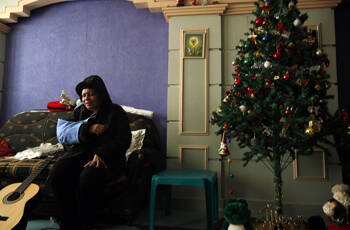Leaders of the Coptic Catholic Church in Egypt said a deadly attack against Christian worshipers was an act of political destabilization and a sign of the increasingly radical "Islamization" of the country.
"The newspapers are pointing the finger at al-Qaida. But terrorism arises in sectors of the Muslim society where other organizations encourage intolerance. For 40 years in Egypt, there has been a creeping Islamization that pervades every area of society," said Coptic Auxiliary Bishop Kamal Fahim Awad Hanna of Alexandria.
Bishop Hanna told the Vatican newspaper, L'Osservatore Romano, Jan. 3 that the government was making every effort to ensure the safety of worshipers as they prepared for the Coptic celebration of Christmas Jan. 7. All Christian churches have been surrounded by security forces, he said.
The reaction among most Egyptian Christians to the Jan. 1 attack has been fear and concern, but not the desperation that prompted a few spontaneous public protests, he said. "For the great majority of Copts, even in the face of the horror of this attack ... the reaction was moderate, because the faith emphasizes mercy for the victims and forgiveness for those who have erred," the bishop said.
Bishop Hanna said the entire Egyptian society was shocked by the attack and concerned that it could endanger the relatively peaceful relations between Christians and Muslims in the country.
He pointed hopefully to a recent proposal by an official of the al-Azhar Mosque in Cairo to establish a new interreligious dialogue organization called the "House of the Egyptian Family," which would include seven Christian and seven Muslim representatives.
Bishop Hanna said Egyptian schools were the most effective place to stem the spread of fundamentalism.
"They should begin teaching tolerance to children in elementary schools. At present, there is no effort on the part of teachers to impart the concept of unity in the respect of differences," he said.
Cardinal Antonios Naguib of Alexandria, the Coptic patriarch, told the Vatican newspaper that the attack on the church was "a criminal act aimed at destabilizing internal security and harmony among citizens." He expressed his condolences to the families of the Coptic Orthodox victims of the bombing.
"We have complete trust in the wisdom and the determination of the authorities, and are certain that they will adopt the necessary measures to put an end to such painful events," the cardinal said.








